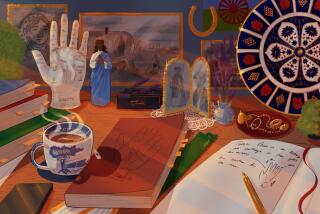The Gifts of Religion in a High-Tech Age
- Share via
The Internet, that highway to a brave new world, undermines communities even as it promises to bring goods, ideas and people together. Ever so slight, the loosening of the bonds between people masquerades as a convenience: E-mail replaces the heartfelt phone call, online research the library visit. Could one ever imagine the holidays without their hustle and bustle? Wait and see, as shopping Web sites proliferate.
NPR commentator Frederica Mathewes-Green knows the perils that technology poses for our communities, but she has a simple antidote. Early in “At the Corner of East and Now,” a group of people refurbish an old church. The building has passed through many hands--Methodist, Baptist, Pentecostal--and is now being prepared to house one of Christianity’s oldest branches, Orthodoxy. Pews are carted off, amplifiers and speakers are taken down. After the work’s finished, Mathewes-Green observes the scene: “The space had a harmony that I hadn’t recognized before, when it was full of pews and electronics. . . . It is not large, this church, but the proportions are peaceful, and it is full of light.”
Uncluttering a church is an apt metaphor for “At the Corner of East and Now,” which is a combination memoir, religious primer and critique of late 20th century consumerism. Like a broken sewer pipe, Mathewes-Green says, consumerism has seeped into many Christian denominations, diluting the Gospel with promises of easy consolation and ignoring the rigorous nature of faith. For her, Orthodox Christianity, a heavily ritualized worship rooted in Byzantine tradition, is better than the worldwide web at keeping a community together. In an often contradictory world, it has remained doctrinally clear and harmonious, and she wants to tell us all about it.
Such a book is a risk. Like those well-dressed people who stroll through neighborhoods on a Saturday morning, Mathewes-Green is likely to have the door slammed in her face. Yet she tempers her tendency toward preachiness with common sense and with quirky glimpses of modern spirituality. She ponders suffering, forgiveness and prayer, in the light of centuries-old tradition; she meets monks preaching to the punk rock subculture; in a thrift store, she despairs over peoples’ throwaway mentality; she describes the eerie sense of otherness in an icon’s gaze.
One highlight of the book is an encounter with the Christians of the Cornerstone Festival, an annual music festival outside Chicago that draws large crowds of tattooed, metal-studded youths to hear bands like Dead Pharisees, Mortification and Crimson Thorn. Talking to one of the singers, she asks why they mimic the secular metal bands they’re supposed to oppose.
“We’re kind of like sheep in wolves’ clothing,” he answers. “People listen to the music, they like it, then they read the lyrics and get interested [in the Gospel].”
The musicians are proud of the way they have appropriated mainstream music for evangelical purposes. But when Mathewes-Green turns to the souvenir stands and finds T-shirts of a chihuahua saying “Yo Quiero Jesus” and of a crucifixion with the words “This Blood’s For You,” she finds a disappointing trivialization of the Christian message. If not this, then how does one attract the MTV generation?
The Orthodox answer is simple: Stay the course. Faith changes people, not the other way around. Readers may be repulsed by the apparent inflexibility, but the book is a thoughtful source of inspiration for any truth-seeker, not to mention ministers interested in learning how other churches handle pop culture. If as Mathewes-Green writes, most people have been fed a boiled down “oatmeal version” of faith, then “At the Corner of East and Now” offers more demanding fare for those with discerning palates.
More to Read
Sign up for our Book Club newsletter
Get the latest news, events and more from the Los Angeles Times Book Club, and help us get L.A. reading and talking.
You may occasionally receive promotional content from the Los Angeles Times.





